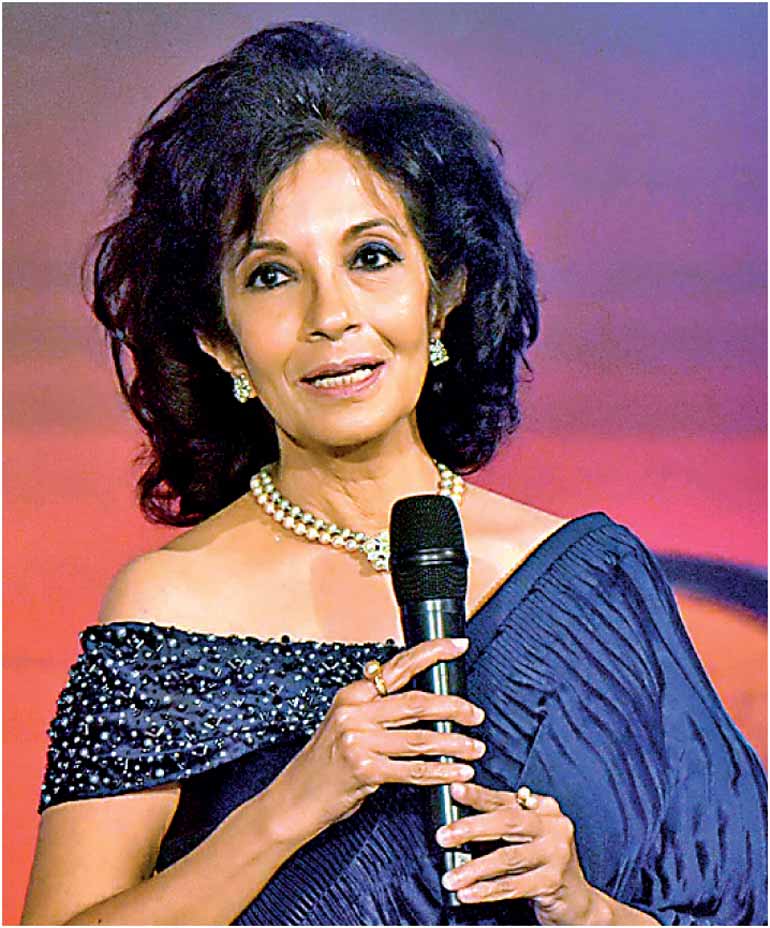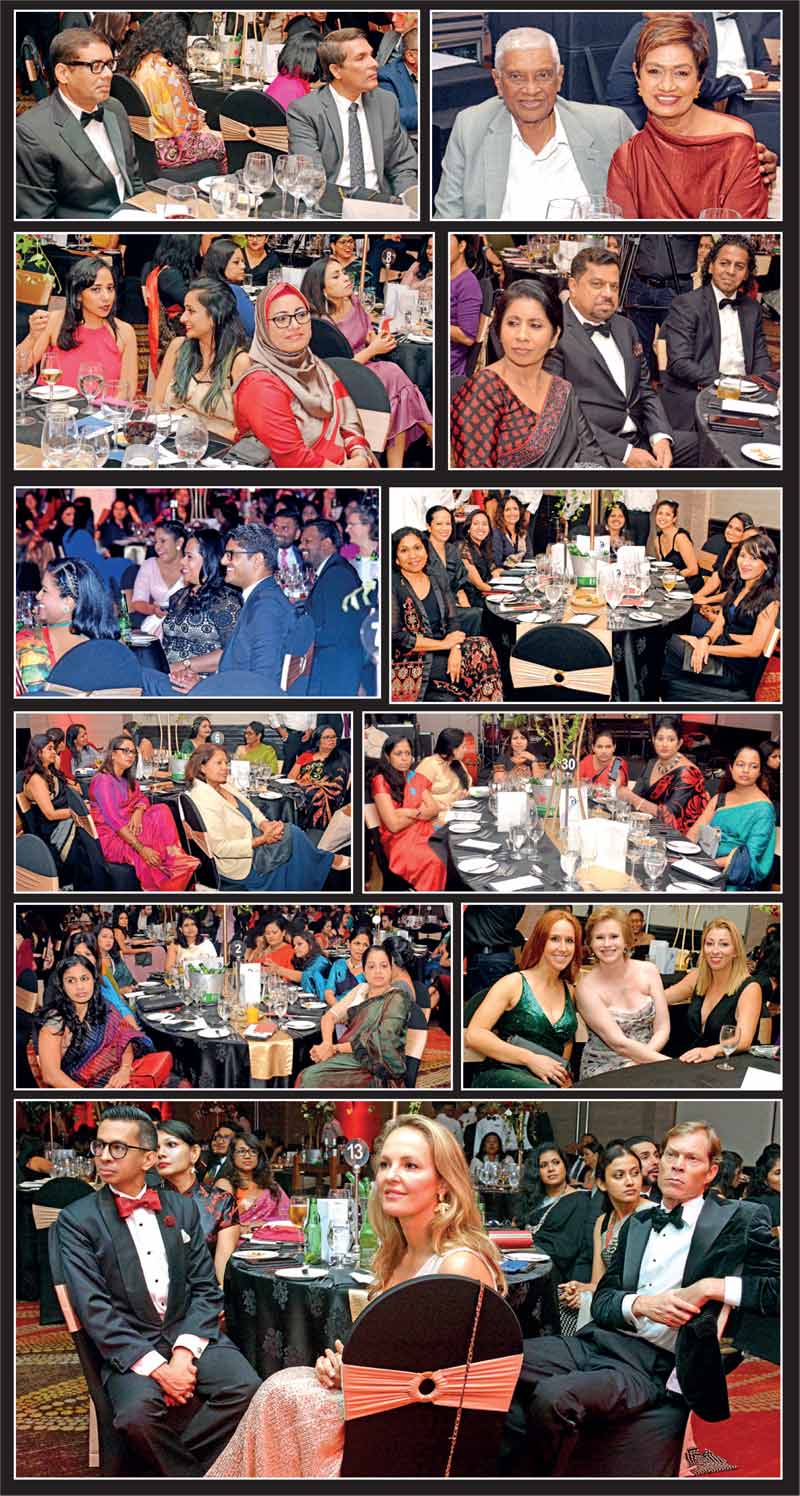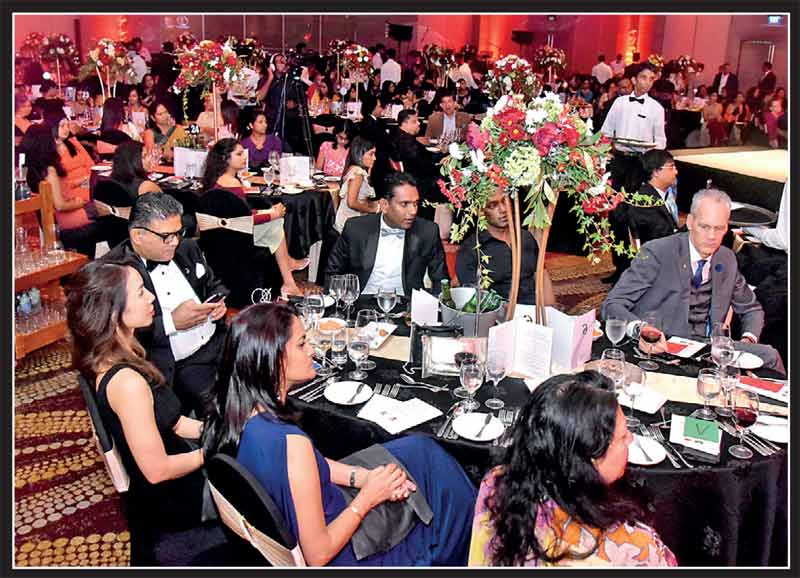Thursday Feb 19, 2026
Thursday Feb 19, 2026
Tuesday, 18 April 2023 17:06 - - {{hitsCtrl.values.hits}}
Daily FT-Interbrand International Women’s Day 2023 Gala amplifies ‘DigitALL: Innovation and technology for gender equality’ and ‘EmbraceEquity’ for a better Sri Lanka
By Dilrukshi Fernando
 |
|
Moderator Daily FT CEO-Chief Editor Nisthar Cassim |
 |
|
Partner Interbrand Sri Lanka and the Maldives and Headlines PR Chairman Anusha David
|
|
– B. Braun Sri Lanka and Maldives Managing Director Dr. Nathalie de Dieuleveult
|
|
– Heineken Lanka Ltd. Managing Director Maud Meijboom van Wei
|
|
– Sampath Bank PLC Senior Deputy General Manager International Banking Shashi Kandambi Jassim
|
|
– Mastercard Sri Lanka Director Mahesha Amarasuriya
|
|
– Dinara Punchihewa
|
|
– Mintpay Co-Founder and COO Urmila Chandrasekeram
|
|
– Sisterhood Initiative Founder Nabeela Iqbal
|
Glamour and elegance were abundant, yet did not overshadow substance at the Daily FT-Interbrand International Women’s Day 2023 celebrations, held recently at the Oak Room of the Cinnamon Grand, Colombo.
The well-attended gala amplified the combined themes of IWD 2023: ‘DigitALL: Innovation and technology for gender equality’ and ‘EmbraceEquity’ across its event lineup, including a fashion show dedicated to diversity and inclusion and a highly interactive panel discussion discussing key challenges and uncertainties faced by women today, both in Sri Lanka and the world.
German multinational and one of the world’s largest medical and pharmaceutical device companies B. Braun Sri Lanka and Maldives Managing Director Dr. Nathalie de Dieuleveult delivered the keynote preceding the panel discussion. Daily FT Editor-in-Chief Nisthar Cassim moderated the all-female panel representing the diverse pillars of Leadership and Management, Technology and Innovation, Marketing, Banking and Finance, Peace and Women’s Rights, and Arts and Entertainment.
The seven-member panel comprised B. Braun Sri Lanka and Maldives Managing Director Dr. Nathalie de Dieuleveult, Heineken Lanka Managing Director Maud Meijboom van Wei, Sampath Bank PLC Senior Deputy General Manager International Banking Shashi Kandambi Jassim, Mastercard Sri Lanka Director Mahesha Amarasuriya, Mintpay Co-Founder/COO Urmila Chandrasekeram, Sisterhood Initiative Founder Nabeela Iqbal and Actress Dinara Punchihewa.
DigitAll: The real Impacts on Gender Equality
Delivering a well-researched and informative keynote address, B. Braun Sri Lanka and Maldives Managing Director Dr. Nathalie de Dieuleveult shared the positives and the negatives of digitisation and its impact on gender roles in society.
“Despite all negative impacts, it has been recognised that the global pandemic and lockdown have been a booster of the digital transformation in our daily life with both positive and negative effects,” said Dr. Nathalie, adding, “It’s well established in various publications that COVID-19 pandemic has been a driver for the digital transformation, the 4th technological revolution is ongoing thanks to ‘technology, automation and collaboration’.”
Referring to her research from various publications of the UN and other global organisations, Dr. Nathalie said that despite several initiatives the gender gap remains or even increases, limiting the benefit of digital transformation across high, mid or low-income countries. “In 2022, it’s estimated that 50% of women worldwide are still offline. In low to mid-income countries Internet penetration is 53% for men, and 41% for women,” she said. The situation in Sri Lanka mirrors this trend, according to statistics shared by Dr. Nathalie, where only 20% of households have a computer and less than 50% of the population uses the internet.
“It’s interesting to see private initiatives from other emerging countries, like Rwanda, where 3,500 women farmers are fully connected through technology information, markets and finance.”
Poor women, belonging to racial minorities experience the negative effect of digitalisation more acutely. If technology as such is not gendered, social and economic circumstances can influence the development and use of digital technology. Therefore it becomes the responsibility of society at large to contribute to minimising the gender gap, irrespective of our position and background. To quote the words of Ban Ki Moon, the former South Korean Secretary General of the UN, “Achieving gender equality requires the engagement of Women AND Men, Girls AND Boys. It’s everyone’s responsibility.”
She said even if the “access gap” to digital technology between women and men has reduced, there are still many women lacking the necessary technological, social capabilities to compete in a global online environment. According to recent statistics, the percentage of women, graduated in engineering is significantly lower than men.
Dr. Nathalie pointed out that the family and social environment play a main role in the education of girls. A patriarchal society will tend to reproduce the pattern of the past.
“We as leaders and probably role models are in a position to encourage women education in the STEAM and ICT, to enhance women employability. An increasing representation will contribute to facilitate gender equality, reduce the bias in digital technology and facilitate the breaking of glass ceilings. With the development of Artificial Intelligence it’s critical to reduce this bias to prevent replication of gender patterns. ChatGPT is a tsunami in digital technology, high concerns are on the impact of the existing job of white-collar category. The lowest educated employee’s population, where still many women land, will be the first impacted,” she said.
She also said empowering women, focusing on latest technology and digitalisation amongst other major reforms, can accelerate the country’s recovery.
Need for equity and digital inclusion across all sectors
All speakers and panellists were keenly aware of the concept of equity and how it related to their respective industries and sectors. They approached #EmbraceEquity from the perspective that men and women are very different but women want all the opportunities available to men and will require different levels of support and guidance to achieve the same goals.
“We are not all equal. But we want to have the same opportunities. Because we are all different, people need different types of support,” said Heineken Lanka Managing Director Maud Meijboom van Wei, in her opening remarks to the panel discussion.
“The single character trait which helped me to overcome challenges in life and my career was to ask what I needed, to get the same opportunities which the men who were becoming General Managers were getting. It takes courage to do this but to get ahead you need to speak up and ask for the opportunities you want,” she further said, encouraging all women in the audience to be courageous and do the same.
The different types of support required by the different groups in society were aptly illustrated by Sampath Bank PLC Senior Deputy General Manager International Banking Shashi Kandambi Jassim in responding to the moderator’s question on initiatives taken by the banking industry for greater financial inclusion of women and vulnerable communities in society.
“Women need financial independence to be empowered,” said Shashi, elaborating how banks of today offer a wide range of products and services which support the needs of women from all walks of life to achieve this goal. An experienced career banker herself, Shashi spoke about how innovation and technology provided by the banking sector allow career women of today to bank on their palm-top, mobile devices. At the other end of the spectrum, banks have to reach women at the grassroots level, where according to Shashi, the biggest challenge would be reaching the underbanked women.
“We have done a lot of programs to ensure our products reach these women and they have access to financing. A lot of women go overseas to do blue-collar jobs to give a better life for their children and families. They try to send money en bloc, through informal channels but their purpose is not achieved, because the money is often misused,” said Shashi elaborating on a pressing social issue that Sri Lanka has been witnessing for years. But the future is hopeful and inclusive for such women whose hard-earned wages contribute to the nation’s economy: “Today, most banks are represented even at the employment agencies and the authorities, where we deliberately push them to open accounts and we handhold them and tell them how to use their accounts, so they can manage their finances from abroad, ensuring that their hard-earned money is used for the correct purposes.”
Financial and technology inclusivity remained a continued theme when Mastercard Sri Lanka Director Mahesha Amarasuriya shared her thoughts, outlining key initiatives taken by the organisation to empower women: “Mastercard, as a diversified technology company truly believes that providing digital payment solutions along with digital literacy will support women to become independent, and empowered, by allowing them to make better-informed decisions, thereby gain more bargaining power at a personal or professional level”.
Mahesha shared two examples with the audience to elaborate further. Firstly, the Mastercard payment gateway solution, provided through most financial institutions and FinTech companies, provides women with an opportunity to reach the global marketplace.
“Being able to accept payments online, women can provide goods and services anywhere in the world, enabling them to be financially independent. There is also Simplify Commerce which is targeted at entrepreneurs and MSMEs (Micro, Small and Medium Enterprises), where we are encouraging new businesses to come up,” she added.
Secondly, Mahesha spoke about ‘Girls for Tech’: a worldwide program launched by Mastercard, to inspire young girls to take up Science Technology, Engineering and Mathematics (STEM) skills. “Girls for Tech is developed by Mastercard, encouraging young girls to follow this program which includes subjects such as encryption, algorithm, and fraud detection, which has been successful across the world, having reached over 3 million girls between the ages of 8 and 15 years, in 50 different countries in 20 different languages.” These types of inclusive programs, Mahesha believes, help to take away certain types of biases and stereotypes which exist in society about tech-related job roles.
As an individual who passionately challenged the notion of “tech is only for boys and not for girls”, throughout her life, Mintpay Co-Founder/COO Urmila Chandrasekeram was eager to share her views on the need for more women to be tech-based entrepreneurs.
“Tech startups begin with a girl or a woman working in technology. Speaking from my experience, I was raised by parents who encouraged me to follow whatever field of engineering I chose to study. However, the mindset out there in society was very different. The first time I encountered this opinion was when a random person asked me at a restaurant why being a girl chose to study Electrical Engineering instead of Medicine,” said Urmila, sharing a very personal experience. This mindset of stereotypical bias and stigma, Urmila believes, scares young girls and women, and prevents them from getting into tech-based studies or job roles, even at the point of choosing subjects for A/Ls or higher education. Entrepreneurship involves taking a lot of risks. Things may or may not work, and one needs to make a lot of sacrifices to get things off the ground.
“Society creates this fear of failure. But in entrepreneurship, you fail, it’s not a failure, it’s learning. You learn something from that experience. You celebrate failure, the same way you celebrate success. That kind of awareness creation and mindset change, to share failed stories, would encourage more women to get into the tech startup space,” Urmila added.
Moving from technology to aesthetics, young Actress Dinara Punchihewa was invited to share her thoughts on how arts, cinema and theatre be used for women’s empowerment. “Art and cinema are great tools to send a message across to a large audience. When I think of art, it could be a one-minute video on YouTube, or it could be a two-hour movie at the cinema. Today people spend a lot more time on their smartphones. So if done correctly, art can make a great impact for empowering women,” said Dinara, sharing an example of a series of short films by female producer Kiran Kir, based on gender equality. The powerful visual imagery in one 10-second short film showed a brother and sister each receiving a glass of milk from their mother, with the brother’s glass being full, while the sister’s glass is only half-full. Noticing the difference, the two siblings divide the milk equally amongst themselves.
“The film had a very short duration but it was very impactful,” said Dinara adding, “As an artist, I think art and cinema are very strong and powerful, more so than people realise. I don’t think there is any company or brand represented in the room today, which does not use art to send a message across to their respective audiences, be it social media or corporate messaging. Therefore we need to realise the power of art and appreciate it more for what it can do to create positive change around us.”
Sisterhood Initiative Founder Nabeela Iqbal brought a very different perspective to the panel, when compared to the other speakers, owing to the nature of her work with young Muslim women, mostly in peacebuilding and human rights-related work.
“Considering the recent effects experienced in Sri Lanka, with the post-pandemic and current economic conditions, the identities we carry as women are often in the minority or the binary, as my fellow panellists also mentioned. Considering the cultures and laws that govern us, the lack of protection offered to vulnerable communities, the decisions we can take over our careers, over our bodies, or something simple as selecting our partners, is rather limited,” said Nabeela, sharing the experiences she had encountered while speaking with young women in her line of work.
She also highlighted the failure of the state to effectively address and provide adequate protection to victims of domestic violence and cyber assault, where former partners share sensitive content of women on digital platforms, making them very vulnerable in society.
Following an in-depth discussion, the moderator fielded a final round of questions to each of the panellists, specific to the industry and area of expertise they represented, before wrapping things up:
Q: In your opinion, Shashi, what is the single biggest challenge for women entrepreneurs?
Shashi Kandambi Jassim: Access to finance is not the only issue which entrepreneurs face, it is much more. Access to the market is a key factor. Access to finance is, I believe, a perception. Because at ground level there are many programs and a lot of funding available to entrepreneurs, SMEs, and start-ups. The main problem is financial literacy. No financial institution will just throw money, they need to see a feasible proposal coming in. It is the lack of financial literacy that limits individuals from coming into a bank and convincing a bank to negotiate and access those funds.
Q: Dinara, as a young actor, what would you like to see in the country and the society overall, to improve the status of women?
Dinara Punchiwewa: The first thing would be equal pay. In mainstream cinema, both female and male artists get paid the same. But it does not happen all the time. What would be nice for filmmakers, producers and directors is to look at their skills, their experience and their talents, and not whether they are male or female. That would be the main thing. I would also like to see more females getting into the production aspects of the cinema industry. It requires a lot of late nights, and it is not fair to expect that in a stereotypical society where women are expected to stay home and look after children. So little things like having flexible hours and maybe including a lactation room on the set would help production companies go a long way toward achieving inclusivity.
Q: Urmila, what can Sri Lanka do to retain good talent? There is an exodus of talent right now and there will be in the future as well. So what can Sri Lanka do?
Urmila Chandrasekeram: The brain drain is more emphasised after the economic crisis. It’s happening right after the school level itself. When I look at my immediate set of friends, I don’t have anyone in Sri Lanka. We all studied abroad and I was the only one to return. It happens at that stage because the number of universities is limited here, therefore the number of graduates you produce will also be limited. So you are seeking education abroad. If there was a way to resolve this, by welcoming foreign universities to set up a branch or their subsidiaries in Sri Lanka, that would help to retain the talent that is currently going abroad. When you produce more graduates, your talent pool is enhanced. We can look into the playbooks of Singapore and India, to allow Fortune 500 companies to open branches in the country, encouraging the talent pool to remain in Sri Lanka.
Q: Mahesha, do you see an enabling environment in the corporate sector of Sri Lanka for young women to succeed?
Mahesha Amarasuriya: If I give an overall answer, yes, because if you look at the overall system, there is a free education system, it supports girls and boys equally at Primary, Secondary and University. If you look at the statistics of girls and boys entering school, it is much the same. At competitive exams such as O/Ls and A/Ls, girls are doing much better than boys, as per the statistics available. At the university entrance again, a higher level of girls entering universities as opposed to boys. But we do not see this number reflected in the participation of the labour force. Women’s participation is only 34% and as it goes higher to the Board Room level representation, the number is only 10%.
So this I see, is where we have the issue. Until very recent years, as women play diverse roles from daughter, to wife and mother, when they transition into the different roles, they tend to either step down or slow down, where they give priority to their families. Especially when women become mothers, to give that care to a baby or a young child, women tend to slow down their careers. I think it’s a pivotal point where employers need to understand and support women with various things such as flexible hours, work from home, extended maternity leave, and daycare centres within the organisation to offer safety to the children; most of which is taking place in the country today. Through these initiatives, you can retain women in the labour force. If at this critical point, they don’t change their mind and do remain, I know they can reach the pinnacle.
Q: Nabeela, what is the one single thing you would like to see from a society or a country, to improve the conditions of the people you are working with?
Nabeela Iqbal: When Jeff Bezos and McKenzie Scott got a divorce, McKenzie Scott made a lot of donations to the Girl Scouts USA and to the Frida Fund, a large feminist funding organisation to which I am an advisor as well. Why I think that is a great initiative is because they thought of directly funding young women, who are leaders to create solutions to the problems they are facing. You are putting young women who are facing the issues, at the frontline of the humanitarian space. For me, that is what I would like to see, where young women facing the issues are at the frontlines, creating solutions and consulting as well.
Q: Maud as a business leader, what would you like Sri Lanka as a country, and companies to do to empower more women, so that they can be very influential at a corporate, at a national level?
Maud Meijboom van Wei: I think the theme of IWD this year says it all. Because digitisation gives access, it creates business opportunities. And if you understand the opportunity, and we all know, if women participate the business results are better, we need to ensure that we educate people. Digitisation also gives access to data and insights, whether it is fair and equal pay, whether it is sharing knowledge across borders, how amazing will it be if women in Sri Lanka can learn via digitisation from women in other countries, who have been successful? You will be more empowered and you can learn faster. I think embracing digital is the way forward. We should jump on it now and let women lead the way.
The Daily FT-Interbrand IWD 2023’s Strategic Partners were Mastercard and Heineken and other partners were Triumph-Sloggi, Sothys Estheti Centre, Serenia Residences Talpe Galle, Supreme Flora, Link Natural Earth Essence, and Cinnamon Grand.
Pix by Upul Abayasekara and Ruwan Walpola




